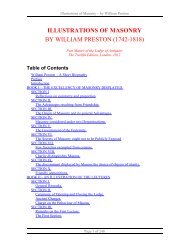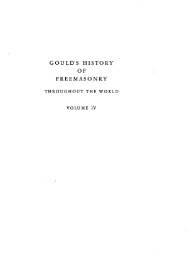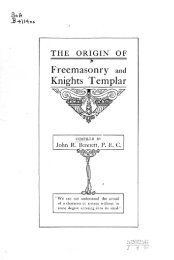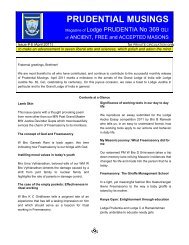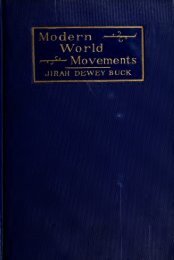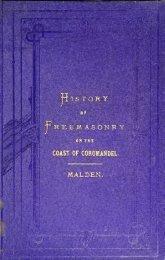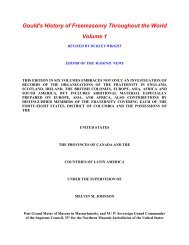- Page 1 and 2: SCOTTISH FREEMASONRY 1725-1810: PRO
- Page 3 and 4: Declarations (i) I, Mark Coleman Wa
- Page 5 and 6: Table of Contents Declarations ii A
- Page 7 and 8: Chapter One: Introduction The ‘Ha
- Page 9 and 10: provide a clearer understanding and
- Page 11 and 12: there are undoubtedly numerous gaps
- Page 13 and 14: Concentrating solely on Scottish or
- Page 15 and 16: The advantage of the present study
- Page 17 and 18: public and national demand for incr
- Page 19 and 20: certain parallels, the extent to wh
- Page 21 and 22: Constitutions’ or ‘Old Charges
- Page 23 and 24: guide to the positive history of fr
- Page 25 and 26: essentially a speculative organizat
- Page 27 and 28: conditions of the lodges in various
- Page 29 and 30: the Lodges on the spot.” 48 They
- Page 31 and 32: acknowledgement is not surprising.
- Page 33 and 34: Lodge resolved that “all the Lodg
- Page 35 and 36: wages and, most importantly, proper
- Page 37 and 38: Scotland had chartered or sanctione
- Page 39 and 40: journeymen masons, or itinerant mas
- Page 41 and 42: control of it.” 89 In an entry da
- Page 43 and 44: territoriality of operative masons,
- Page 45: admission of a “teacher of dancin
- Page 49 and 50: Despite such varying motivations an
- Page 51 and 52: Clawson’s utopian, idyllic defini
- Page 53 and 54: consistent dwindling of lodge funds
- Page 55 and 56: According to Ferrone, “the Great
- Page 57 and 58: life, and its impact as a federal o
- Page 59 and 60: organizational precursor of the agr
- Page 61 and 62: willing to promote such laudable wo
- Page 63 and 64: declared that “none of the Member
- Page 65 and 66: two returns are recorded in Grand L
- Page 67 and 68: 31% 4% Figure 2.2. Dundee Recruitme
- Page 69 and 70: Scotland, and from this institution
- Page 71 and 72: Chapter Three ‘Revival of the Gra
- Page 73 and 74: Grand Lodge’s decision to build a
- Page 75 and 76: Different Colours as the Painter th
- Page 77 and 78: cent of all Ancient lodges. 15 In c
- Page 79 and 80: direct, impact on provincial develo
- Page 81 and 82: Increase of the Craftsmen, and thei
- Page 83 and 84: Table 3.2. Scottish Masonic Distric
- Page 85 and 86: Lodges.” 37 Having carefully cons
- Page 87 and 88: Table 3.3. Scottish Masonic Distric
- Page 89 and 90: officers, 46 and the officers thems
- Page 91 and 92: Furthermore, those Districts design
- Page 93 and 94: geographically dispersed across Sco
- Page 95 and 96: The final analysis shows that durin
- Page 97 and 98:
west, and north of Scotland, as the
- Page 99 and 100:
Number of Occupations 70 60 50 40 3
- Page 101 and 102:
The results suggest that provincial
- Page 103 and 104:
Table 3.6. Occupations of Provincia
- Page 105 and 106:
ancient lore and secrets, yet more
- Page 107 and 108:
philosopher Dugald Stewart joined S
- Page 109 and 110:
103 in some department of the Publi
- Page 111 and 112:
for many of the same reasons that t
- Page 113 and 114:
aquavita and honey.” 92 And meeti
- Page 115 and 116:
e bigger and better than those of o
- Page 117 and 118:
on 30 November 1803 - St Andrews Da
- Page 119 and 120:
Historians have asserted that “on
- Page 121 and 122:
and necessity require and our abili
- Page 123 and 124:
earning a Liberty had by reason of
- Page 125 and 126:
119 The Lodge unanimously agreed to
- Page 127 and 128:
Such as may be Brother Masons Among
- Page 129 and 130:
123 unknown to other nations, is a
- Page 131 and 132:
eighteenth-century teacher and writ
- Page 133 and 134:
lodge had “now become of some con
- Page 135 and 136:
Service;” 177 the rather pusillan
- Page 137 and 138:
admission fees owed by lodges, a re
- Page 139 and 140:
extent of its power and wished to e
- Page 141 and 142:
Although the Treasurers, Chaplains,
- Page 143 and 144:
maintained its early features of ph
- Page 145 and 146:
Chapter Four ‘Behind Closed and G
- Page 147 and 148:
circumstances in the state of Scotl
- Page 149 and 150:
traces of treason among clubs and s
- Page 151 and 152:
145 We your Majesties most dutiful
- Page 153 and 154:
meeting, it was “moved by a Broth
- Page 155 and 156:
Night was spent in the greatest Har
- Page 157 and 158:
Country to such a height, that it w
- Page 159 and 160:
The overall links between freemason
- Page 161 and 162:
conventions in Edinburgh and the ar
- Page 163 and 164:
“crush…democratic opponents whe
- Page 165 and 166:
Although lodges such as No. 1(3) Ab
- Page 167 and 168:
element in the government’s react
- Page 169 and 170:
significant, for the swearing of oa
- Page 171 and 172:
freemasons, that were secretive by
- Page 173 and 174:
provided that the name of the socie
- Page 175 and 176:
forms for the necessary declaration
- Page 177 and 178:
The committee met on 28 February 18
- Page 179 and 180:
While in London, Dalkeith received
- Page 181 and 182:
175 The Act of Parliament quoted is
- Page 183 and 184:
177 treasonable purposes’ the sai
- Page 185 and 186:
Not all lodges, however, felt that
- Page 187 and 188:
If this is indeed the case, much th
- Page 189 and 190:
esolved. It was much less a reactiv
- Page 191 and 192:
Chapter Five ‘I Dub Thee In the N
- Page 193 and 194:
any Grand Lodge.” 10 Moira’s mi
- Page 195 and 196:
adical in practice than several oth
- Page 197 and 198:
potentially subversive. His doubts
- Page 199 and 200:
virtue. 25 This program for restruc
- Page 201 and 202:
not my intention to doubt that, the
- Page 203 and 204:
197 courage to unmask such horrors,
- Page 205 and 206:
appears that “some of the materia
- Page 207 and 208:
As we have seen in Chapter 3, the t
- Page 209 and 210:
The relationship between freemasonr
- Page 211 and 212:
‘Lodge’…and, surreptitiously
- Page 213 and 214:
Maybole Royal Arch, was included am
- Page 215 and 216:
209 maintains that the Royal Arch d
- Page 217 and 218:
Wartski notes, “the high office b
- Page 219 and 220:
parliamentary reforme” faced poss
- Page 221 and 222:
meetings. 108 Following their state
- Page 223 and 224:
lodge “had obtained [its] Charter
- Page 225 and 226:
The Court Trial The court battle th
- Page 227 and 228:
and others that radical Irish dissi
- Page 229 and 230:
223 Israel are said to be in bondag
- Page 231 and 232:
Conclusion Remarkably, the Maybole
- Page 233 and 234:
fact, the criminal information accu
- Page 235 and 236:
lodges and denying access to the gr
- Page 237 and 238:
patriot politics than to the hierar
- Page 239 and 240:
conduct of the Society” in order
- Page 241 and 242:
leaders of the Whig party in Scotla
- Page 243 and 244:
the resignation of William St Clair
- Page 245 and 246:
On 14 October 1807, a conference wa
- Page 247 and 248:
y concluding that Cunningham’s mo
- Page 249 and 250:
the negotiations, “a fresh troubl
- Page 251 and 252:
Cunningham’s nomination and Mitch
- Page 253 and 254:
aware of a minority Tory presence,
- Page 255 and 256:
Gibson to bring forward the allegat
- Page 257 and 258:
ecord no motion to secede until 11
- Page 259 and 260:
quamprimum from the room, with all
- Page 261 and 262:
The name ‘Cleardoubt’ adds to t
- Page 263 and 264:
Although the author stresses the Gr
- Page 265 and 266:
ecame clear that Scotland was being
- Page 267 and 268:
masonic matters. Unfortunately, his
- Page 269 and 270:
again resurfaced, this time in a mo
- Page 271 and 272:
asserts the authority of masonic lo
- Page 273 and 274:
admitted into the Act in consequenc
- Page 275 and 276:
hundred and ninety nine” was subm
- Page 277 and 278:
the Masonic Secession of 1808 would
- Page 279 and 280:
settlement as it was “beneath the
- Page 281 and 282:
society. Although it continued to f
- Page 283 and 284:
Lodge of Scotland abjured compromis
- Page 285 and 286:
Bibliography Manuscript Sources Anc
- Page 287 and 288:
Lawrie, Alexander, printer. Petitio
- Page 289 and 290:
Cameron, C.A. “On the Origin and
- Page 291 and 292:
Firminger, W.K. “The Romances of
- Page 293 and 294:
Knoop, Douglas and G. Jones, “An
- Page 295 and 296:
Murdoch, Steve. Network North: Scot
- Page 297 and 298:
Torrington, William F. House of Lor
- Page 299 and 300:
Editorial Note: Appendices I am par
- Page 301 and 302:
3 Victualling 1736 Mason (2) Bailli
- Page 303 and 304:
Barber (2) Glover Brewer Shoemaker
- Page 305 and 306:
Glover (2) Goldsmith (1) Grocer (1)
- Page 307 and 308:
Totals Tradesmen (54%) Gentleman (3
- Page 309 and 310:
Accountant (2) Merchant (17) Druggi
- Page 311 and 312:
Vintner Minister Bookseller Cooper
- Page 313 and 314:
Coach Wright Student (14) Military
- Page 315 and 316:
Mason (4) 1740 Mason (2) Surveyor 5
- Page 317 and 318:
Merchants: 9 Wigmakers: 1 Gentlemen
- Page 319 and 320:
Armourer: 1 Bakers: 2 Barbers: 1 Br
- Page 321 and 322:
Merchants: 5 Shipmasters: 5 Shoemak
- Page 323 and 324:
CMB: Cumberland Society CPC: Caperc
- Page 325 and 326:
James Callender 16 (CK): ES, MS, SS
- Page 327 and 328:
Andrew Haliburton (G): MS David Dal
- Page 329 and 330:
Hugh Murray 87 (CK): ES, MS, RGSL,
- Page 331 and 332:
Rev. Dr. George Wishart, Minister i
- Page 333 and 334:
Stonehaven Saint Ebbe Moncur Kirkca
- Page 335 and 336:
1755-56: Sholto Charles, Lord Aberd
- Page 337 and 338:
1737: William Congalton 1738: Patri
- Page 339 and 340:
1773: Harry Erskine 1774-75: Willia
- Page 341 and 342:
Appendix 5: Grand Lodge of Scotland
- Page 343 and 344:
to do by Ancient usage anything to
- Page 345 and 346:
the Minutes of the Grand Lodge rela
- Page 347 and 348:
1 st Answer: London 16 February 180
- Page 349 and 350:
343 authority of the Kilwinning Lod
- Page 351 and 352:
345 the date of the Letter form the
- Page 353 and 354:
347 warranted him to make his compl
- Page 355 and 356:
349 of the Charter and Send it to t
- Page 357 and 358:
351 the Lodge the Brethren unanimou
- Page 359 and 360:
353 letter or a Charter from the Gr
- Page 361 and 362:
355 December One thousand seven hun
- Page 363 and 364:
357 of the lodge No. 14 should sati
- Page 365 and 366:
[Signed] Ex Deliberatione Dominorum
- Page 367 and 368:
Appendix 9: Grand Lodge Minutes Reg
- Page 369 and 370:
363 powers of the Subcommittee to a
- Page 371 and 372:
Appendix 10: Grand Lodge Minutes Re
- Page 373 and 374:
Appendix 11: Roman Eagle Lodge Minu
- Page 375 and 376:
Modern Grand Lodge of England: Appe
- Page 377 and 378:
Appendix 13: National Archives of S
- Page 379 and 380:
373 Lodge - published their resolut



